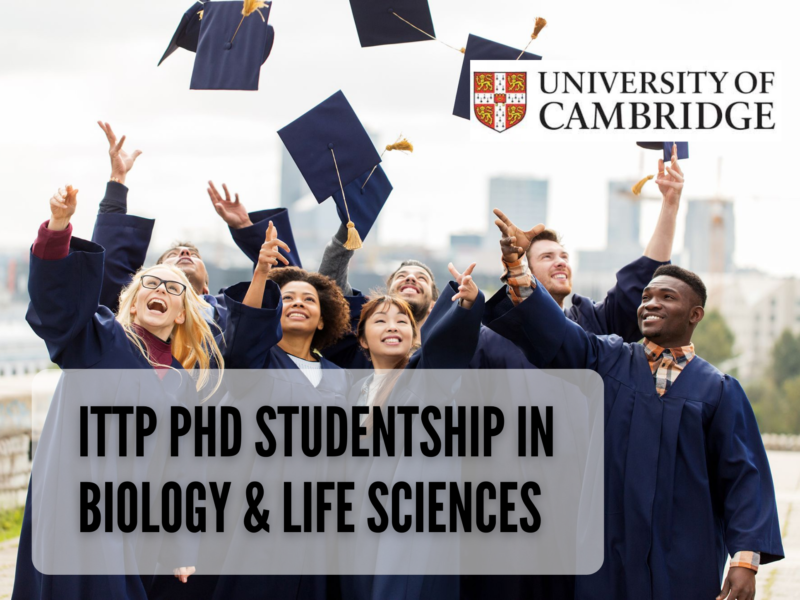This is an MRC Integrative Toxicology Training Partnership (ITTP) studentship and includes specific training opportunities, including a week away to attend toxicology training for all scheme members. The University of Cambridge offers this excellent scholarship in Biology & Life Sciences for the academic session 2021-2022. Funding is available at the level of Home Fees and a stipend of £17,500 per annum.
Table of Contents
Summary
| Scholarship Sponsor | University of Cambridge |
| Scholarships level | PhD studentship |
| Award Amount | £17,500 per annum |
| Study area | Biology, Immunology |
| Opening date | February 19, 2021 |
| Closing date | March 14, 2021 |
Project Description
A number of external factors such as infection, therapeutics and abiotic stimuli lead to inflammatory reactions in healthy individuals. While the signalling pathways leading to inflammation have been extensively studied, how chromatin and epigenetics control inflammatory response by influencing transcription remains poorly studied.
We have recently shown that stress converges on a specific transcriptional output defined as SITA (Aprile-Garcia et al., 2019, Nature Struct Mol Biol). The SARS-CoV-2 infection causes a similar SITA response in lung epithelial cells (Weigang et al., in submission). Liquid-liquid phase separation and biomolecular condensation of transcriptional regulators underlie SITA (Rawat et al., 2021, Mol Cell).
The proposed project will investigate the epigenetic regulation of SITA and stress response in the context of inflammation using mouse models and cell-culture systems. The project will be carried out in close collaboration with Novartis and AstraZeneca, with an opportunity for industrial training for the PhD student.
The MRC Toxicology Unit is a leading international research Unit providing state of the art research facilities with excellent opportunities for collaborative interaction within a vibrant community at the University of Cambridge.
There are a variety of training modules and courses that students are encouraged to attend. Also, students follow the Toxicology Unit’s weekly external and internal seminar programs. They are included in the postdoc/student forums, which take place each month and offer excellent opportunities for collaboration and career development.
Key references: Weigang S et al., Sawarkar R (in submission) SARS-CoV-2 causes global chromatin changes in host cells, defining therapeutic opportunities.
Rawat et al., Sawarkar R (2021) Stress-induced condensation of NELF drives transcriptional downregulation. Mol Cell. DOI: 10.1016/j.molcel.2021.01.016.
Antonova et al., Sawarkar R (2019) Heat-shock protein 90 control the expression of cell-cycle genes by stabilizing metazoan-specific HCFC1. Cell Reports. 29(6):1645-1659.
Aprile-Garcia et al, Sawarkar R (2019) Nascent protein ubiquitination is required for heat-shock induced gene downregulation. Nature Structural and Molecular Biology. 26(2):137-146
Application Deadline
The deadline for applications is March 14, 2021
Further information can be found at the MRC Toxicology Unit Website: https://www.mrc-tox.cam.ac.uk/postgraduate/applications
Eligibility Criteria
Candidates must expect to obtain qualifications at the level of a first-class or 2.1 Honours Degree in a related discipline and must be enthusiastic about collaborating closely with other team members.
In addition to an excellent academic record, we are also looking for candidates with hands-on experience in one or more of the following areas: Molecular cell biology, immunology, inflammation biology, genomics, chromatin research, bioinformatics, in vivo mouse biology.
Award Information
Funding is available at the level of Home Fees and a stipend of £17,500 per annum.
Application Process
- If you have any queries regarding the application process, please contact Bronwen Chamberlain at bc535@mrc-tox.cam.ac.uk
- Please quote reference PU25771 on your application and in any correspondence about this vacancy.
- The University actively supports equality, diversity and inclusion and encourages applications from all sections of society.
- The University has a responsibility to ensure that all employees are eligible to live and work in the UK.









 PhD Position in Medicine and Health at the University of Oldenburg
PhD Position in Medicine and Health at the University of Oldenburg